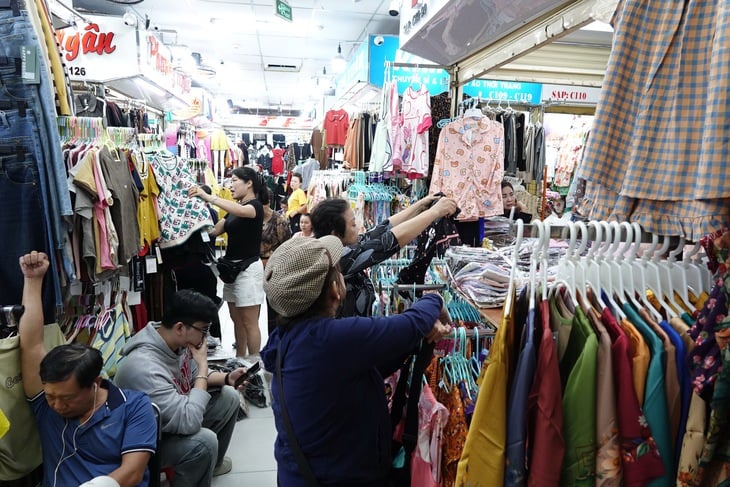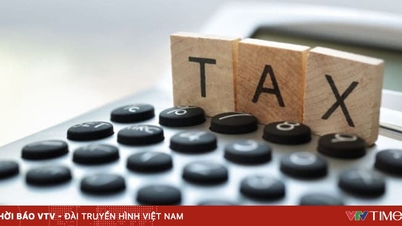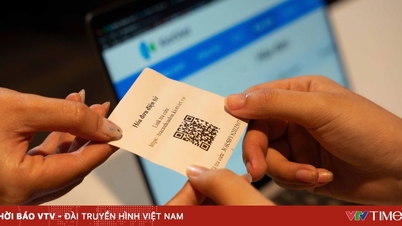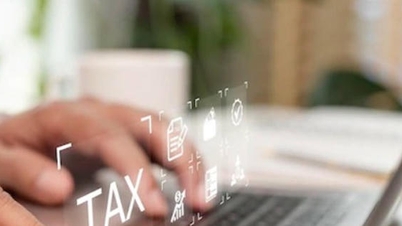
Business households at Ben Thanh market - Photo: TTD
Tuoi Tre recorded the question of the trader and the answer of the Tax Department ( Ministry of Finance ).
Households want tax calculation software, Tax Department responds
Talking to Tuoi Tre, Ms. Nguyen Thi Mai (a business owner on Thuy Khue Street, Hanoi ) said that the software company had instructed her on how to use the electronic invoice software. Now she is ready to switch to tax declaration from next year and is no longer worried like a few months ago.
However, to provide maximum support to businesses, Ms. Mai suggested that the software should always calculate taxes. Businesses only need to check and pay taxes, not declare them.
Also related to tax declaration and payment, Ms. Nguyen Thi Thuy, owner of a household appliance business (Hoang Quoc Viet, Hanoi), is worried about incorrect tax calculation when switching to tax calculated based on revenue. Therefore, the tax authority needs to notify each household of the tax amount such as non -agricultural land use tax.
"When a business household sells goods and issues electronic invoices, the tax authority already knows the revenue. Therefore, the household does not need to declare taxes anymore but pays taxes according to the data reported by the system" - Ms. Mai proposed.
Regarding this proposal, the Tax Department said it is building an automatic tax calculation application system from electronic invoice data. This is a breakthrough solution to reduce the burden of declaration for business households and increase the accuracy of tax calculation.
The Tax Department will develop an application (or function on the eTax system) that allows the synthesis of all business household revenue data from the electronic invoice system and other sources, thereby automatically determining the amount of tax payable according to regulations, creating a suggested tax declaration. Business households only need to log in, check the information and confirm to submit the declaration, instead of having to calculate from the beginning, which is prone to errors.
"Each business household has a tax information table, recording revenue from invoices, calculating VAT and personal income tax. Households can download or print pre-filled declarations. This helps any household fulfill their obligations without having to hire an accountant" - the Tax Department informed.
Can e-commerce platforms issue invoices instead?
Like many businesses, Ms. Luu Thuy Hanh (Lang Ha, Hanoi) is wondering how to declare and pay taxes on the platform in the future. She sells on platforms such as Facebook, Shopee... The platforms have declared and paid taxes on behalf of businesses. So can the platform issue electronic invoices on behalf of businesses?
Regarding tax obligations for business via e-commerce platforms, the Tax Department said that if the sale is made on a platform with payment functions, the platform will deduct and pay VAT and personal income tax at a rate based on revenue. If the year-end revenue is less than 200 million VND, the excess tax paid by the platform will be refunded.
In case of selling on a platform without payment function, the business household must self-declare and pay tax each time it occurs, monthly or quarterly.
Regarding the authorization for the issuance of electronic invoices, the Tax Department said that the responsibility for issuing electronic invoices belongs to the seller and service provider.
At the workshop "The tax is about to be abolished, what should business households prepare?" organized by Tuoi Tre newspaper on October 8, answering this question, Mr. Mai Son - Deputy Director of the Tax Department - said that according to regulations, business households with revenue of over 1 billion VND must issue electronic invoices generated from cash registers.
In case the business wants to issue an electronic invoice on their behalf, they need to negotiate with the exchange. "In case the buyer requests an invoice, we expect the exchange to issue an invoice on behalf of the seller.
Currently, e-commerce platforms have deducted and paid taxes on behalf of households and individuals selling on the platform. Therefore, we will adjust the regulations to suit reality, create convenience for businesses and ensure correct and sufficient tax payment to the budget" - Mr. Son shared.
17,100 billion VND
That is the revenue from business households up to the end of June 2025. Of which, Ho Chi Minh City has the largest number of business households in the country, contributing more than 5,436 billion VND. Next is Hanoi, the revenue from business households reached 3,371 billion VND.
Tax mechanism for 4 groups of business households
In the first 7 months of this year, the Tax Department said that the country had about 2.3 million stable business households. The Department proposed a tax management model for business households based on revenue thresholds when eliminating lump-sum taxes in 4 groups:
* Group 1: revenue from 200 million VND or less with more than 1.5 million households. This group does not have to pay VAT and personal income tax, only has to declare revenue twice a year to determine tax obligations. Regarding accounting books, recording is very simple, supported by free software. It is not required to open a separate bank account for business activities.
* Group 2: revenue from over 200 million to 3 billion VND, about 791,000 households. This group must pay VAT and personal income tax at a percentage of revenue for each business line.
Regarding revenue declaration, households must perform quarterly and annual settlement. It is mandatory to use electronic invoices generated from cash registers if revenue is over 1 billion VND and there are business activities of selling goods and providing services directly to consumers.
This group is required to open a separate bank account for business purposes. The bookkeeping system, according to the Tax Department, will be implemented simply on software.
* Group 3: revenue from over 3 billion to 50 billion VND has about 12,000 households. VAT policy requires applying the deduction method. Personal income tax will be calculated on taxable income at a tax rate of 17%.
* Group 4: revenue from 50 billion VND or more with 1,464 households. Tax liability is similar to group 3, revenue declaration is similar to businesses, monthly or quarterly and annual settlement. In addition, this group is required to use electronic invoices with codes or electronic invoices generated from cash registers.
As for accounting books, it is mandatory to apply the accounting regime of micro-enterprises or medium-sized enterprises.
Source: https://tuoitre.vn/cuc-thue-go-vuong-cho-ho-kinh-doanh-20251103010447602.htm







![[Photo] Closing of the 14th Conference of the 13th Party Central Committee](https://vphoto.vietnam.vn/thumb/1200x675/vietnam/resource/IMAGE/2025/11/06/1762404919012_a1-bnd-5975-5183-jpg.webp)





























![Concert G-DRAGON 2025 WORLD TOUR [Übermensch] IN HANOI, presented by VPBank opens additional ticket sales](https://vphoto.vietnam.vn/thumb/402x226/vietnam/resource/IMAGE/2025/11/06/1762426536117_g-dragon-2-1762423854661759159856-232-0-931-1336-crop-1762424077076938947374.jpeg)










































































Comment (0)